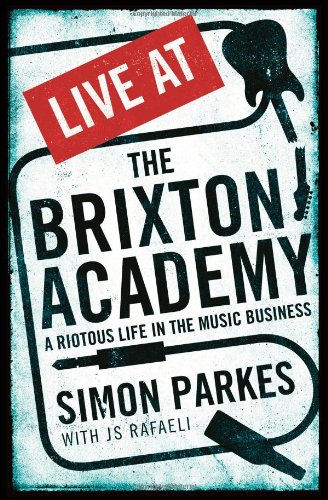‘Live At The Brixton Academy’
Simon Parkes & JS Rafaeli
(Serpent’s Tail)
 Nowadays there’s an Academy venue to be found in most major UK cities, but it all started with Lincolnshire native Simon Parkes’ acquisition of a dilapidated 1920s former cinema in Brixton, south London, in 1983. If you’re wondering why Parkes chose the name ‘Academy’, the truth is that it came to him in a random flash of inspiration, not long after he cannily persuaded the building’s former owners to sell him the lease for just one pound. Yep, this man had serious balls, and they were to be tested many a time over the next decade and a half.
Nowadays there’s an Academy venue to be found in most major UK cities, but it all started with Lincolnshire native Simon Parkes’ acquisition of a dilapidated 1920s former cinema in Brixton, south London, in 1983. If you’re wondering why Parkes chose the name ‘Academy’, the truth is that it came to him in a random flash of inspiration, not long after he cannily persuaded the building’s former owners to sell him the lease for just one pound. Yep, this man had serious balls, and they were to be tested many a time over the next decade and a half.
Nowadays, in Brixton, you’re never far away from a health food shop or newly-developed block of flats, but back in 1983 it was very much the violent, half burnt-out, poverty-stricken neighbourhood of old. Over the next decade, Parkes and his team have to contend with all manner of challenges, from overcoming booking agents’ prejudices of the area, to local gangs attempting to take control of the Academy’s security operations, to Grace Jones refusing to perfrom until she was supplied with her desired brand of vintage champagne. Fearsome stuff, all told.
Still, they persevered, and the rewards were many. After two years of surviving via (often troubled) reggae gigs, Parkes had The Clash specifically requesting to play some London shows at the Academy, and by the end of the decade, his maverick approach ensured that major acts of all genres were bypassing the once all-powerful Hammersmith Odeon (now Apollo) in favour of a trip to SW9. Megastars like The Police and AC/DC booked themselves in for weeks of rehearsals, and the stories of the Academy’s outlandish club nights highlight just how much of a different world those early days were. What indoor venue could get away with hosting a full-scale fairground bumper car ride at a club night these days?
We at Crossfire have been through the Academy’s doors more times than we care to remember, and seen plenty of amazing shows to boot. If you’ve ever had so much as a passing interest in London’s live music history, this book is an essential piece of the puzzle.
Alex Gosman